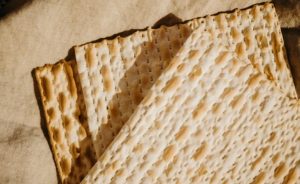Officially known as Sefirat Ha’Omer – Counting the Omer – the Omer is a unique time in the Jewish calendar where we count down from Passover to Shavuot.
Counting the Omer is a command straight from the Torah. Leviticus 23:15-16 reads:
You will count for yourselves – from the day after the Shabbat, from the day when you bring the Omer of the waving – seven Shabbats, they shall be complete. Until the day after the seventh Sabbath you shall count, fifty days…
So, the Omer originally meant the measure of barley grain that was brought to the Temple as an offering during Passover. The Torah tells us to count seven full weeks from that offering, and to celebrate Shavuot on the fiftieth day.
How do we Count the Omer?
The Omer is counted by saying a bracha – blessing – every evening through the seven weeks. We then state the number of days, and break into weeks and days so that we definitely don’t lose count of the seven weeks.
For example, on the thirteenth night, we say, “Today is the thirteenth day, making one week and six days of the Omer”.
What Happens in the Omer?
The Omer has come to be a very significant time in the Jewish year, with a unique set of customs.
Firstly, there are other holidays in the Omer: five significant dates that fall within the this seven-week period, which shape the Jewish and Israeli calendar. They include the Jewish Holocaust Memorial Day, Israel’s days of memorial and independence, and Jerusalem day.
There are also several restrictions in place through the seven weeks, due to the story of Rabbi Akiva’s students. Rabbi Akiva was a prolific scholar with more than 24,000 disciples. During the period of the Omer one year, a plague tore through the students, decimating their numbers. They died in their thousands, and Rabbi Akiva attributed the disease to how his students treated each other.
The Omer was consequently instituted as a period of public mourning. In Judaism, that means restrictions on haircuts, weddings, and music.







